I usually read regular old not-literature novels—and in terms of female characters, I’m a lot happier with the spread I read. I get girls who are fighters and diplomats and complex and dynamic in positions of respect and power.
I struggle with literature because more often than not, this is not the case.
As I just said, I’m not a literature junkie, but I’ve done a little research and dug out a few titles to support my point. They're either ones I've either read or recognize—and I am by no means an expert, which means you are welcome to challenge me. But in what I've read, I notice a few things.
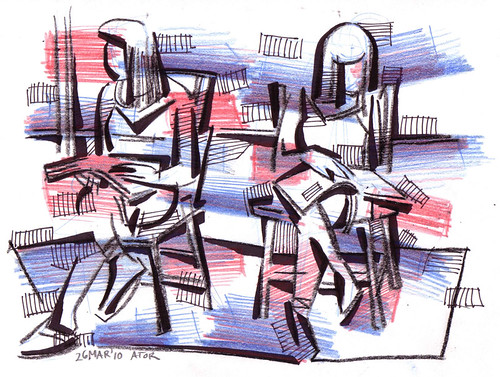 |
| Flickr Credit: r8r |
Women face SO MUCH OPPRESION (socially… economically… politically… religiously…)
The Awakening—Edna Pontellier cannot self-actualize or be with the man she loves because societal standards say she must stay at home and be there for her husband and kids.
A Handmaid’s Tale—Offred is the possession of others and is basically an object kept for her reproduction value alone.
Pride and Prejudice—some idiot based his financial security and retirement on having a son, which didn’t happen, which means that in order to guarantee future security the Bennett sisters must marry because they are inadequate economic heirs.
The Scarlet Letter—Hester is publicly humiliated and despised because of her adultery and her baby daddy’s anonymity, and faces the threat of having her daughter taken away from her, and is only ever remembered as an adulterous instead of a really good seamstress and decent human being.
Jane Eyre—Jane longs for liberty and morality at the same time but by nature of those things the way she wants her life to work out doesn’t always; also, many people like her aunt and school and boyfriends try to take away her liberty, which is also a problem.
(Okay, I still love Jane Eyre, and it’s a decent struggle. But if we look at the group, it’s still a pattern.)
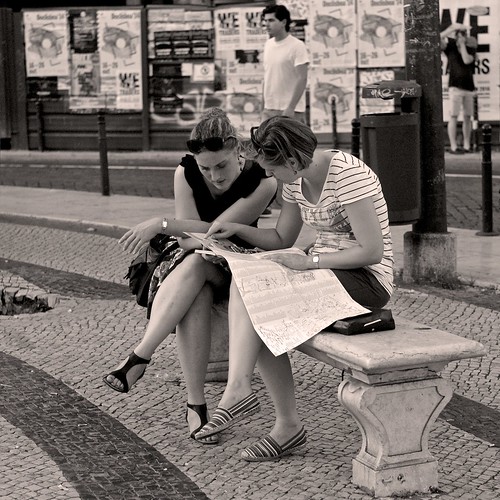 |
| Flickr Credit: Pedro Ribeiro Simões |
Or their own story is overshadowed
To Kill a Mockingbird—to be fair, there are some other ladies in this book, but the real story is about Atticus and Tom Robinson and Boo Radley; Scout isn’t exactly her own protagonist.
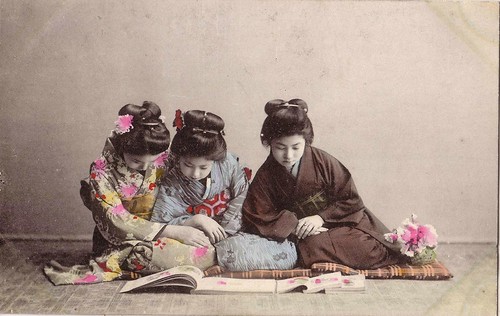 |
| Flickr Credit: janwillemsen |
Women sometimes don’t even feature in literature, or their presence wouldn’t pass the Bechdel test.
Lord of the Rings—Gladriel, Arwen, and Éowyn are the main female characters (not that Lobelia Sackville-Baggins doesn’t count) and none of them ever meet; it’s a story almost exclusively about guys.
Lord of the Flies—a group of boys on an island; no girls exist.
Of Mice and Men—if I recall correctly, there is only one female character, Curley’s wife (she doesn’t even get a name), who “exists as a symbol of temptation to Lennie.” She dies.
The Name of the Rose—takes place in a medieval monastery, the only girl is also nameless and the love interest of the narrator. In the movie the cracks against women made me want to punch the screen. Ugh.
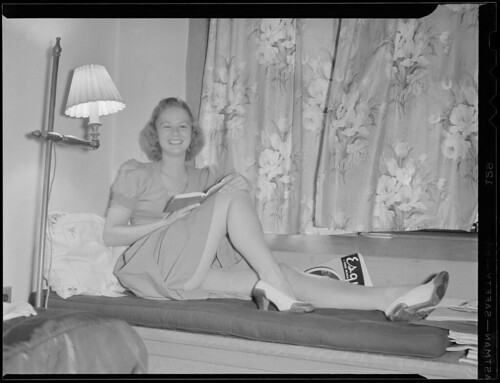 |
| Flickr Credit: Boston Public Library |
Even if they do pass the Bechdel test it doesn’t indicate that the women are particularly well-written or complex.
Catcher in the Rye—there’s a conversation between Phoebe and her mom that allows this book to pass the test; all the same, the fact that it’s the only example of female bonding (even though Holden goes to a boy’s school and spends a lot of time alone, blah, blah, blah) doesn’t exactly redeem the story.
The Invisible Man—there were a few women in the story, I guess, it’s just that they didn’t get much attention. Just homemakers, proprietors of rooms to rent, plot devices. There’s nothing memorable about them.
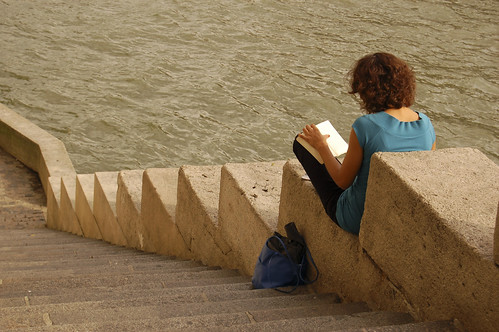 |
| Flickr Credit: Adam Mulligan |
I haven’t read any of the following books, nor looked them up—but I can tell you what I know of their reputations.
Moby-Dick—the actions of a vengeful [male] captain (Quigley? I can’t remember if that’s from Sherman’s Lagoon or not) result in a dead white [male] whale .
Don Quixote—a would-be [male] knight and his short and useful [male] friend go about trying to be chivalrous in Spain.
Frankenstein—a [male] doctor creates a [male] monster with his [male] henchman, Fritz or Igor or something. BUT I do recall that Dr. Frankenstein has a fiancé, who I think dies.
The Strange Case of Dr. Jekyll and Mr. Hyde—I’ve seen the musical, and there are like three girls (not counting other prostitutes) that don’t pass the Bechdel test (I think?) BUT in terms of what I know about the book another [male] doctor tries to mess with the forces of good and evil and makes another [male] monster that kills many people. Most of them are male.
The Old Man and the Sea—well, there’s a male old man. I seem to recall he gets baptized or is a Christ figure, some kind of religious significance. And possibly there is a male boy.
~*~*~
DO YOU KNOW HOW DEPRESSING THIS LIST MAKES ME? Sure, they have literary merit. Sure, they say a lot about the human condition. And sure, they’re probably not the books that everyone is going to pick up.
It’s just that they do have reputation and respect, and if the question in literature is “should we write women who bond under the chains of repression or women who do nothing at all?” THAT IS NOT THE RIGHT QUESTION.
And that is my problem with literature.
To compare, these are the books that sit on my Favorite Bookshelf, the majority of which are MG/YA novels. The number in parenthesis indicates the number of books in a series that I own.
This is the key:
* Female Protagonist
* Plot-significant female secondary characters
* Passes the Bechdel Test
* 3+ Female Characters
* Female Bonding Present
And these are the stats:
The Grisha Trilogy (2) *****
Artemis Fowl (10) ****
Ranger’s Apprentice (12) ****
The Scarlet Trilogy (2) *****
The Princess Bride **
The Pandora Series (3) *****
The Outsiders *
The Odyssey **
To Kill a Mockingbird *****
The Ever-Expanding Universe Trilogy (2) *****
The Lunar Chronicles (2) *****
The Twilight Saga (5) *****
The Things They Carried *
The Unwind Dystology (4) *****
Earthfall **
The H.I.V.E. Series (10) ****
The Importance of Being Earnest ****
Basically, literature has a lot to answer for. Maybe they want to describe what it’s like, and showcase what life is for women, but I think what is nice about novels is that they describe the way it should be.
And guys should not be the only ones who get to screw up big time in literature.
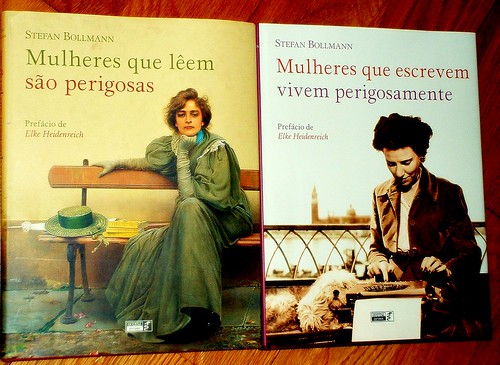 |
| Flickr credit: Laura |

This was a very interesting post to read! And I liked it, and it got me thinking, don't get me wrong. There's very much a good place for women in literature, and we deserve it. Totally. :) These are just my respectful thoughts on the subject.
ReplyDeleteI think in the case of older, more classic books, you have to consider the context, because it WAS different for women then, so books and female characters that come out of it are less an intentional prejudice and more the simple fact that this was normal in that context. That doesn't mean it's right (and I don't condone it) but that's the fact. In Pride and Prejudice that was simply the way things were, and I happen to think that the way Lizzie behaved within that context was admirable - she didn't marry the people she was supposed to, particularly, and was spunky and very much stood up for herself. As female characters go, I was impressed.
Other times, women don't feature in a story for what I hesitate to call good reasons, but definitely for reasons. The Invisible Man isn't about women, nor would featuring a major women character benefit it. It's about an /invisible man/. (and it's a great book!) The same goes for The Old Man and the Sea. Lord of the Flies (one of my favorite books) is a study in human nature and schoolboys on a island are used to illustrate that; since it was primarily a group of schoolboys stranded, where would a girl take part in that? Lord of the Rings centers around a medevial fantasy world full of battles and quests and fighting; realistically, not many women would take part in that. (and let's not forget Eowyn, certainly, who holds her own wonderfully.) I hate to say this, really, because it makes me sound like I'm for what you're speaking against here, and I do think women deserve more credit in fiction, but it's helpful to remember context and that sometimes, that's not what the story is about. And there are some good, respected books featuring stronger women - 1984, Brave New World (to an extent), The Great Gatsby, and Les Miserables, to name a few.
But this WAS a good post, and I hope you don't think I'm bashing you. :)
Dangit, I replied and the computer erased my response. Grr.
DeleteANYWAY: Don't worry, I invited you to challenge me and I feel like I was respectfully challenged in a non-bashy way, so thanks for braving the risks and sharing your thoughts, because these are really good!
I definitely didn't take context into my account, and in part that was because I feel like, to some extent, if we are a progressive community that sees men and women as equals, books about women would be just as popular and admired as women, which I don't think is the case just yet. And maybe it won't be, especially since most literature is meant to exist as a meaningful work regardless of time barriers.
You are still completely right, though. Historically, and even know, the situation is really rather that of a "man's world," as it were, which means that Lizzie Bennett and even Jane Eyre were really rather unusual and impressive for their time, even though by today's standards that isn't quite true.
Likewise, a "man's world" would indicate that male characters would be the main medium with which to share important ideals, which I suppose does explain their choices. I still embitter the lack of female bonding in various books—for example, yes, Eowyn is a good character but she's also incredibly isolated and even though there are battles, quests, and fighting, I also have trouble believing that she was the only woman in Rohan. Obviously, as you said, it's still a story about men and makes sense for men, as it does in all your great examples.
And there are stronger women—I haven't the strength to read Les Mis, but I know there are a few nice female leads, and Gatsby definitely has some interesting women—which you are absolutely right about. I think my struggle remains, though, even despite context and stronger women elsewhere: a lot of lit puts women to the side or out of the limelight, even with reason, and that just keeps us sitting in a circle of poor representation.
Still, you're totally right, and thanks for challenging me, because I didn't even think about that when I wrote this! You made lots of good points, and even if I didn't exactly forgive all of literature I'm still glad you reminded me of what I forgot. XD
Excellent post! I agree with most of what you've said here. Women have had it hard in literature for years. The worst, for me, is when female characters *are* included but written very stereotypically. In the case of women facing oppression, it does get depressing but you have to remember that this was life for women for many years. I think the idea of a world where women had equal freedoms as men was hard to imagine. Still, that's no excuse for writing half the population as many writers have done, notably Tolkien. Of course, males might be expected to feature in the limelight of LOTR since it's a medieval fantasy. But I notice there *are* a lot of strong women in history books. It makes me wonder if many of these classic writers were, perhaps unintentionally, misogynistic and unwilling to represent women. I find some of this bias subtly rubbing off on me. I struggle to include as many female characters as males in my own story and they are usually less complex and less intriguing. It's something I'm working on. Years of reading male dominated literature hasn't helped.
ReplyDeleteHowever, in modern YA, women are featuring much more in books and there's been more awareness about the importance of female characters. There's hope for women characters!
I think that's the struggle I find more often than not, and now especially. Especially when females are written as villains, it's almost like they only have emotional motivations and they can easily be dismissed as 'crazy women' when, were she a male character, she would either be well-written an interesting or else a total flop anyway. And I think we tend to forget that there have been millions of awesome women who have lived before us—for me, I live in the Western U.S. where women had to work as hard as any man to survive without the help of organized society or technology.
DeleteI think the things we read are the things that are going to influence the things we write, and so if we read a lot of male-centric works then we might forget that women are just as cool and awesome. Modern YA is definitely my hope right now, and I look forward to greater characters in the future!
As a guy, I may have a more biased lean on this, not having to endure all the feministic trials and tribulations that women face today, as they continue fighting for equality. (Because, you know, making 75 cents for every man's dollar is just screwed up.)
ReplyDeleteWhat I hath noticed is that women usually end up really worse off because of guys. Usually. Looking at two classic novels, Hamlet and Daisy Miller (which is one of the better books I've read recently), we see Ophelia and Daisy Miller die over a man. Ophelia literally goes insane over an emo teenager and drownded herself. Daisy Miller is actually more sympathetic, because she's a young, friendly, flirtatious naïve girl, but technically her young, friendly, flirtatious naïve personality is what kills her. The guys she hangs around with, despite them being young, friendly, flirtatious? Nothing. The main character, Winterbourne, actually forgets about Daisy and goes back to an elderly lover in Geneva.
Then again, there's the great example of Penelope in the Odyssey. That takes guts, for a woman not to associate herself with a man (besides Ulysses, making it kind of pointless). But it's far progressive for its era.
My dad actually showed us an article on the price of being a woman—especially when it comes to things like razors, etc. that really have no functional difference between the genders are still more expensive for women. It costs more to be a lady, which is silly. :P
DeleteGuys do tend to screw over girls in books, and there is technically historical precedent for that. (And I know I need to read Daisy Miller, because I read about it elsewhere and it sounds good and archetypal.) But girls are bred to naive, and then they can't cope with something that requires more from them. It isn't that that stuff doesn't happen that bothers me, though, it's also that it doesn't really inspire people to act differently. Reverse psychology is not the most successful tactic one could take.
I do like Penelope, she was awesome. I think the Greeks, even if they were still long-ago-guys, had a pretty good hold on the nature of balance and things. Ish. The various city-states had various philosophies. But you know what I mean.